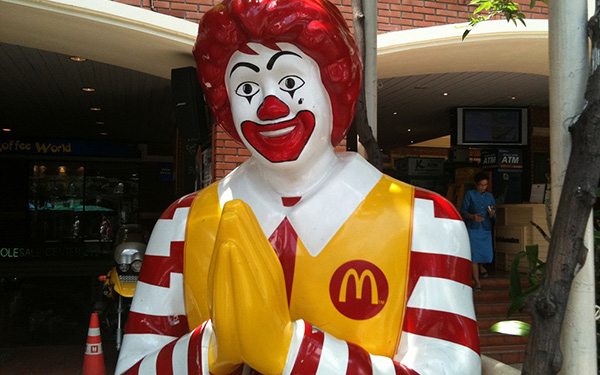Now I appreciate the title may be a little incendiary, but do allow me to explain why I decided to headline this piece with such a loaded question.
Before I settled in Bangkok in January of 2016 – as I have mentioned in a previous piece – I spent the best part of 2015 travelling across Asia, with the year bookended by time spent in the Kingdom.
It was only on my return to Thailand at the end of the year that I fully appreciated just how developed and essentially ‘western’ life was here – particularly in Bangkok. From the countless hotels, restaurants and bars to the supermarkets, malls and businesses, to the sheer volumes of westerners who actually live here.
Only after having spent a little time experiencing other Asian countries and cultures did this reality really hit home.
On a personal level, I began to consider whether this was a positive or negative reality for me. Was I simply looking to shoehorn the life I had in England into a more tropical setting?
Or should I be looking for something more authentic, more real than that?
I questioned whether there is anything essentially ‘Thai’ about my life at all, other than occasionally having to break into a little ‘taxi Thai’ and, of course, now considering it completely normal to eat rice for breakfast…
Broadening out from this I began to wonder whether this westernisation has had a positive or negative impact on Bangkok and Thailand, socially and economically, and how the country has changed and is changing from a cultural perspective for both the native and foreign people who live here.
Put simply, Thailand appeals so strongly to foreigners thanks to the warm hospitable people, the incredible food, the tropical climate, stunning natural beauty and, for those who are so minded, the burgeoning and overt sex industry, dating back to the late 1960s when the country was a haven for American GIs seeking R ‘n’ R from the horrors of the Vietnam war.
From such ‘beginnings’ it is estimated that around 29 million people now visit Thailand annually, accounting for a whopping 20 percent of the national GDP.
Recent studies indicate that Bangkok is now the most visited city in the world by international tourists. These figures are consistently rising year-on-year too. Whilst a significant proportion of those tourists will not be from western countries – Chinese tourists account for a large percentage of the annual visitors – the numbers are still huge.
Align this with the working foreign populace living in Bangkok – some estimates say there are as many as 100,000 Europeans in the capital – and of course those elsewhere in the Kingdom, and economically speaking, foreigners are an absolute boon. They are and have been essential to the shaping of Bangkok into the sprawling international metropolis we see today.
I was minded to think of how this foreign influence could negatively affect the local people when reading various reports about a number of communities in Bangkok who have been forced to leave where they live. Plans to develop public parks, for instance, or extend the public transport system on the land they have occupied for decades are displacing them.
It’s extremely sad that Soi 38 in Thong Lor is now but a shadow of what it once used to be, as livelihoods are changed irreversibly in the name of ‘development’.
These are drops in the ocean when assessing the sheer scale of capitalist growth and how it has negatively impacted on local people. There are undoubtedly many more examples where people’s voices simply have not been heard, as space is cleared for the next hotel, luxury condominium, or aircraft hanger sized shopping mall. This erosion of ordinary life is a human and cultural tragedy.
Without wishing to come across as a total party pooper, the recent Songkran festivities could be offered up as another indication of how Thai culture is changing thanks to foreign influence. There’s a huge contrast between the more sedate, traditional celebrations still enjoyed in local and more rural areas to the raucous alcohol-fuelled parties found in Bangkok and other big cities. The hedonistic Full Moon Party on Koh Phangan is now as synonymous with Thailand as a tuk-tuk trip to Wat Pho.
I often think of Thailand as a country of contradictions: there is a great sense of general freedom to largely do as you wish, contrasting with the fact that the country is run by a controlling military junta; Buddhist traditions are juxtaposed against the well documented sex industry; and how the chaotic hustle and bustle of daily life somehow finds cohesion and settled functionality. From the “Hi-So” Bangkokians to the simple Isaan farmer. From searing heat and water shortages to tropical monsoons and annual floods.
And central to it all is the melting pot of Bangkok as East meets West.
Beyond dispute is that Bangkok is a fascinating and culturally vibrant city and I await with interest how the capital and Thailand will change and develop in future years, for better or for worse.
Essentially, it comes down to personal preference to decide whether Bangkok is too western or not – it’s certainly a city with many different faces in a figurative and literal sense, and I don’t doubt that for many, western comforts sitting alongside eastern traditions are what give Thailand real allure. It is important however to sometimes question at what cost comes this marriage…
Ultimately though, who am I to disagree with 29 million people?
Featured image is by @FelixTriller and is used under a Creative Commons licence


